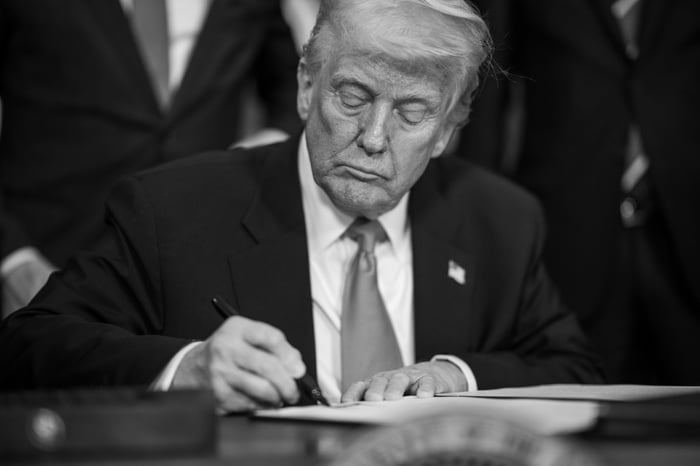Trump Tariff Plunge: 3 Phenomenal Stocks to Buy at Bargain Prices Right Now
Just because Wall Street has proved to be a superior wealth creator over the long run doesn't mean stocks are impervious to bouts of volatility. Since President Donald Trump announced his "Liberation Day" tariffs on April 2, we've witnessed some of the wildest swings in the Dow Jones Industrial Average (DJINDICES: ^DJI), S&P 500 (SNPINDEX: ^GSPC), and Nasdaq Composite (NASDAQINDEX: ^IXIC) since their respective inceptions.
On April 3 and April 4, the benchmark S&P 500 produced its fifth-largest two-day decline in history. Meanwhile, on April 9, the Dow Jones, S&P 500, and Nasdaq Composite logged their largest respective single-session point gains on record, as well as some of their best days in history from a percentage perspective. These gyrations have seen the Dow and S&P 500 firmly enter correction territory, and the Nasdaq plunge into a bear market.
Where to invest $1,000 right now? Our analyst team just revealed what they believe are the 10 best stocks to buy right now. Continue »
While there are a number of catalysts whipsawing Wall Street, including the historical pricey-ness of stocks, it's the president's tariff talk that stands alone atop the proverbial pedestal.

President Donald Trump signing an executive order. Image source: Official White House Photo.
Trump's tariff announcements brought about historic volatility on Wall Street
Initially, President Trump declared a 10% sweeping global tariff, which was accompanied by a series of higher reciprocal tariffs on countries that have historically run adverse trade imbalances with the U.S.
Trump's stated goal with tariffs is to generate additional revenue for the U.S. economy, protect American jobs, and encourage companies to make their products on U.S. soil (thereby avoiding any added taxes). But what's laid out on paper doesn't always translate to the real world.
For instance, Trump's "Liberation Day" announcements make little differentiation between output and input tariffs. An output tariff is a duty placed on finished goods imported into the U.S. Meanwhile, input tariffs are added to goods used to complete products domestically. Input tariffs run the risk of reigniting the prevailing rate of inflation and making U.S. goods less price-competitive with those being imported from overseas markets.
There's also the possibility of Trump's tariffs inciting an even larger trade war with China, as well as U.S. allies. It's a worrisome development considering the Atlanta Federal Reserve's GDPNow model is forecasting the steepest organic contraction in the U.S. economy for the first quarter since the Great Recession (excluding the COVID-19 pandemic quarters).
Furthermore, Trump's propensity to change his tune on tariffs is causing instability on Wall Street. Despite the president instituting a 90-day pause on reciprocal tariffs on April 9 -- this is what caused the aforementioned largest single-day point gains in history for the Dow, S&P 500, and Nasdaq -- there's no cohesive or consistent message as to which products will be subjected to tariffs.
But there is one silver lining to be found among this chaos. Statistically, a highly volatile market has been the ideal time for long-term investors to put their cash to work in high-quality companies at a discount. Amid the Trump tariff plunge, three phenomenal businesses are ready to be bought right now at bargain prices.
Pfizer
The first unstoppable business that's become an amazing deal during the turmoil created by Trump's tariff announcements is pharmaceutical behemoth Pfizer (NYSE: PFE). While it's possible pharmaceutical stocks may be included in future tariffs, this isn't a deal-breaker for Pfizer or investors.
What's interesting about Pfizer stock is that the company has been punished for its own success. In 2020, it generated $41.9 billion in full-year sales, with no revenue from COVID-19 treatments. By the end of 2024, Pfizer delivered $63.6 billion in net sales, with roughly $11 billion coming from its COVID-19 vaccine (Comirnaty) and oral therapy (Paxlovid), on a combined basis. Even though COVID-19 sales have fallen from north of $56 billion in 2022 to $11 billion last year, Pfizer is still in considerably better shape than it was when the decade began.
Something else investors can take solace in is the fact that most healthcare stocks are highly defensive. No matter how volatile things get on Wall Street, people don't stop becoming ill or requiring prescription medicines. Demand for the company's novel therapies tends to be consistent year after year.
This year should be particularly exciting for Pfizer given that it's moved past the acquisition-related expenses that held its bottom line down in 2024. The $43 billion deal to acquire cancer drug developer Seagen in late 2023 should transform Pfizer's oncology pipeline, bolster its bottom line, and result in meaningful cost savings in 2025 (and beyond).
Best of all, shares of the company are historically cheap and producing a jaw-dropping annual yield. Investors can pick up Pfizer stock right now for an estimated 7 times forecast earnings for 2026. To boot, its nearly 8% dividend yield is nearing the highest level in the company's storied history.

Image source: Getty Images.
Enterprise Products Partners
A second superb stock to buy right now amid the Trump tariff plunge is oil and gas goliath Enterprise Products Partners (NYSE: EPD).
With the spot price of crude oil recently hitting a four-year low, it's understandable why investors might be leery about putting their money to work in oil and gas stocks. In particular, the margins of upstream drilling companies are adversely impacted by sizable declines in the spot price of crude.
However, Enterprise Products Partners is an energy middleman, known as a midstream company, which is largely insulated from these wild fluctuations in the spot price of energy commodities. Enterprise owns more than 50,000 miles of transmission pipeline, 26 fractionation facilities, and can store in excess of 300 million barrels of petroleum/refined liquids.
What makes this company so special is the nature of the contracts it signs with upstream drilling companies. Aside from being long-term, these contracts are predominantly fixed-fee. This fixed-fee aspect removes inflationary pressures and spot-price volatility from the equation, which leads to highly predictable operating cash flow looking a year or more into the future.
Operating predictability is especially important for midstream companies like Enterprise Products Partners. On top of the occasional bolt-on acquisition, it's spent approximately $7.6 billion on major capital projects set to come online between now and the end of 2026. Many of these projects are geared at expanding its natural gas liquids exposure and should provide an immediate lift to its profitability.
To round things out, Enterprise has raised its distribution for 26 consecutive years (it's currently yielding north of 7%), is valued at less than 10 times forecast earnings in 2026, and should enjoy a notable uptick in distributable cash as its capital expenditures decline after this year.
AutoZone
The third phenomenal stock that's ideally positioned to benefit in the Trump tariff plunge is auto parts retailer AutoZone (NYSE: AZO).
Keeping in mind that the Trump administration has changed its tune on which products/goods are subject to tariffs on multiple occasions, placing tariffs on foreign-produced vehicles will likely incentivize drivers to keep their existing vehicles even longer.
A May 2024 report from S&P Global Mobility, a division of the better-known S&P Global, found the average age of vehicles on U.S. roads had hit an all-time high of 12.6 years. For added context, this is up 1.5 years from the average vehicle age in 2012. Better-built vehicles, coupled with tariffs, should mean AutoZone will be relied on in a growing capacity by vehicle owners.
With macro factors undeniably working in AutoZone's favor, the company is capitalizing by rapidly expanding its distribution network. Specifically, it's building 200 mega-hubs, each of which is expected to carry up to 110,000 stock keeping units. The idea here is to centralize these mega-hubs such that customers always have the ability to get the part(s) they need with relative ease.
But what AutoZone might be best-known for is its superior share repurchase program. Since fiscal 1998 (the company's fiscal year ends in late August), it's spent $37.8 billion to buy back more than 155.4 million shares. In total, the company has reduced its outstanding share count by 90.3% in 27 years. Companies with steady or growing net income and declining outstanding share counts should see their earnings per share climb over time.
The last puzzle piece is AutoZone's still-attractive valuation. The company's forward price-to-earnings ratio of 21 remains inexpensive considering its unrelenting buyback program, ideal tariff positioning, and the steady aging of American vehicles on public roadways.
Sean Williams has positions in Pfizer. The Motley Fool has positions in and recommends Pfizer and S&P Global. The Motley Fool recommends Enterprise Products Partners. The Motley Fool has a disclosure policy.
 Wall Street Journal
Wall Street Journal